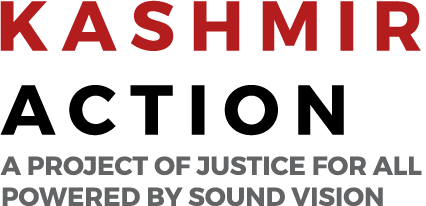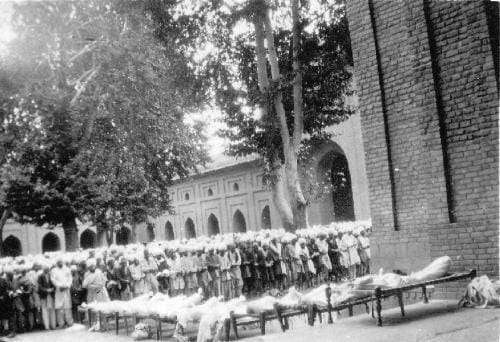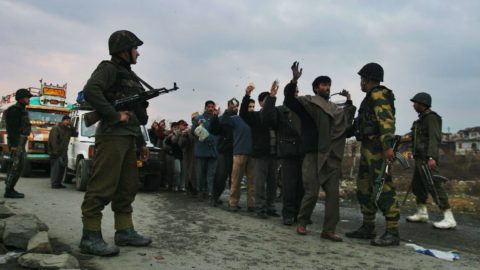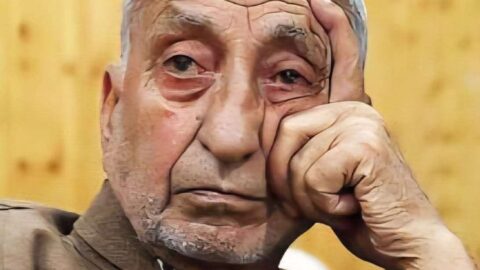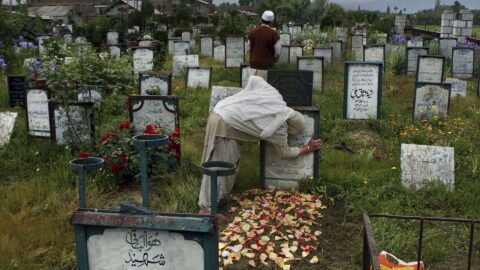A Mini-Report on India's Response to the November 10 Attack Justice for All — When…
India cracks down on Kashmir Martyrs’ Day, silencing memory of resistance
July 13, once a state-sanctioned public holiday in Kashmir to commemorate the 1931 martyrs—men who stood for freedom and symbolized the valley’s political awakening—has now become a day of silence and suppression.
India’s Hindu nationalist government has erased the day from official calendars, barred public commemorations, and sought to wipe it from collective memory.
But now, regional political parties are once again face to face with New Delhi, demanding the restoration of the day’s rightful place in history and calling for the return of its public recognition and dignity.
Indian authorities intensified restrictions across Srinagar on Saturday, sealing roads, detaining political leaders, and preventing prayers at key mosques as Kashmiris attempted to mark Martyrs’ Day, an event once commemorated with state honour but now scrubbed from the official calendar.
The crackdown came ahead of July 13, the day in 1931 when 22 Kashmiri Muslims were gunned down outside Srinagar Central Jail by forces of the tyrannical Dogra regime. For decades, the day stood as a symbol of collective resistance and was recognized as a public holiday. But after New Delhi revoked Jammu and Kashmir’s special constitutional status in August 2019, Martyrs’ Day was among the first casualties of the state’s political erasure.
“Today, this commemoration remains criminalized, censured, and delisted; even the memory of the collective Kashmiri nationhood goes against the current Hindu nationalist rule in Kashmir,” said Inshah Malik, a Kashmiri political theorist and scholar whose family has a personal connection to the 1931 massacre, while talking to JFA.
Earlier this year, tensions flared in the legislative assembly when a BJP minister branded the July 13 martyrs as “traitors”, while rejecting a proposal to restore the day as a public holiday.
The remark sparked outrage among Kashmiri parties, who demanded it be struck from the official record. For many, the moment confirmed what has long been suspected: that remembrance itself has become a form of dissent.
This year, authorities barred access to Mazar-e-Shuhada, the martyrs’ graveyard in downtown Srinagar. Prayers at the historic Jama Masjid were also disallowed, and key political figures, including those from the National Conference and Hurriyat, were placed under house arrest. Police issued warnings that any violation of the restrictions would lead to legal action.
Malik told JFA that among those killed in 1931 was her grandmother’s cousin, one of thousands who had gathered outside the Central Jail to demand the release of Abdul Qadeer, a Pashtun servant of a British officer vacationing in the valley.
Qadeer had been arrested after delivering an impromptu speech at Srinagar’s Khanqah-e-Moula, urging Kashmiris to rise against the Dogra monarchy.
He was charged with sedition and “wanton provocation,” and his trial, which began on July 4, 1931, drew thousands of Kashmiris. When the crowd rose to offer the noon prayer on July 13, Dogra forces opened fire.
“This wasn’t just an isolated tragedy,” Malik said. “It was the beginning of Kashmir’s political awakening, a defiance of imperial authority and a collective demand for dignity.”
That awakening, according to human rights lawyer and researcher Nasir Qadri, marked the birth of a distinct political consciousness in the valley. “The 1931 uprising wasn’t simply civil unrest—it was a decolonial moment,” he explained. “It asserted rights against a regime based on dispossession and racial hierarchy.”
Qadri said the events of that year foreshadowed Kashmir’s future as a national liberation movement, one that took its claims to the United Nations but was ultimately undermined by geopolitical calculations. “International law, while claiming to uphold justice and self-determination, has historically enabled imperial domination,” he said to JFA.
“In Kashmir’s case, it has failed to protect the people’s basic rights, instead offering legal cover for continued occupation.”
He believes the deliberate removal of Martyrs’ Day from the public calendar is a continuation of this historical pattern.
“Delisting July 13 is not about historical revisionism alone, it is a strategic move to delegitimize Kashmiri political identity altogether,” Qadri said.
“By criminalizing public memory, the state is signaling that any narrative rooted in resistance, sacrifice, or collective Kashmiri agency must be erased or rewritten.”
The targeting of Martyrs’ Day, analysts argue, reflects a broader pattern of silencing within Kashmir since 2019. Even mourning has become politicized.
Yet despite the bans and barriers, the day continues to resonate in private spaces and quiet remembrance.
“July 13 is a reminder of the sacrifices that root us in our struggle for justice,” said Ather Zia, a Kashmiri poet and anthropologist, while speaking to JFA. “No state can erase that faith.”
Zia described the resistance in Kashmir not simply as political but spiritual. “In Kashmir, resistance is an obligatory prayer offered with every gasp of air,” she wrote in a poem shared for the occasion. “Azadi is a harkening, to the foremothers and forefathers of resistance, to the prayer that is still being prayed, to the martyrs rising one after another.”
For many in the valley, the weight of this history is no longer carried in public events, but in hushed conversations and personal reflection.
“It’s not just the holiday they took away,” said a young student from downtown Srinagar, requesting anonymity. “They are trying to erase the feeling that this day ever mattered. But how do you erase something every household remembers?”
A student from Baramulla said the crackdown around July 13 was not surprising anymore.
“They’ve made it so normal now,” she said. “No announcements, no gatherings, no media coverage. It’s like we are expected to forget, but we haven’t.”
Across the valley, that spirit persists, even as security forces try to bury it under silence. To many, remembering is no longer a ceremony but a form of defiance. And in Kashmir, where even memory is watched, the quiet act of recalling July 13 has itself become a resistance that refuses to fade.
